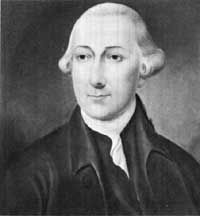Joseph Hewes (January 23, 1730 – November 10, 1779) was born in New Jersey to a family of Quakers. Here, he would receive his primary education and head off to college in Princeton. Upon leaving Princeton, Hewes became a successful merchant and moved to North Carolina.

He rose quickly in politics and was elected to serve as a delegate to the First Continental Congress and Second Continental Congress. He would serve alongside fellow North Carolina delegates William Hooper and John Penn.
Political Life
North Carolina politics were much different than in New England politics. With radicals such as Samuel Adams leading the charge in New England and events such as the Boston Massacre and Boston Tea Party occurring in Boston, New England became the lightning rod for independence.
The Southern Colonies were slower in coming to these ideals, but most North Carolinians were in favor of independence by 1773. Joseph Hewes was originally from the middle colony of New Jersey but quickly rose to fame in North Carolina with his smooth personality and cordial behavior. He was elected to the First Continental Congress in 1774.
However, the road to independence for North Carolina was not an easy one. Joseph Hewes did not support independence from Britain and sided with the Quaker from Pennsylvania, John Dickinson.
Hewes believed that the 13 original colonies had experienced injustices at the hands of the British Crown and were being unfairly taxed without appropriate representation, but he did not believe that the colonies should sever ties completely. He was in favor of the Olive Branch Petition that was sent and rejected by King George.
Joseph Hewes would soon become in favor of Independence. There is no doubt that John Adams and the success experienced by the colonists at the Battle of Bunker Hill and the Battles of Lexington and Concord aided in convincing him to join the cause, but Hewes joined the cause after learning that North Carolina public opinion was in favor of it.
He would struggle to convince the other delegates of North Carolina to vote in favor of independence and would be one of the first southerners to be in favor of independence and was often scolded or interrupted when he rose to speak at the meetings of the Continental Congress.
Nevertheless, it never deterred him, and slowly, he and the others were able to convince most of the delegates that Independence was inevitable.
Contributions and Death
Congress appointed Joseph Hewes as the Secretary of the Navy. The only problem with being Secretary of the Navy in Colonial America was that America did not have a navy but a handful of privateers or merchant ships that had been fitted with cannons.
These ships paled in comparison to the British frigates and Ship of the Lines. Hewes was basically in charge of creating something out of nothing, which he did, and his accomplishments would become one of the greatest military accomplishments during the American Revolutionary War.
In order to counter the powerful British Navy, Joseph Hewes provided his own fleet of ships, outfitted them with weaponry, and placed who he believed were the most competent men to captain these ships.
One of these men, John Paul Jones, would become notorious in the war for his defeat of the Serapis and his famous quote, "I have not yet begun to fight!" Hewes would lay the foundation for the American Navy and would serve as Secretary until 1779, when he retired from Congress.
Joseph Hewes died shortly after his retirement from Congress. He had suffered from ill health for some time. Most of the delegates from the Continental Congress came to the funeral and mourned the loss of one of the great men of American History.

